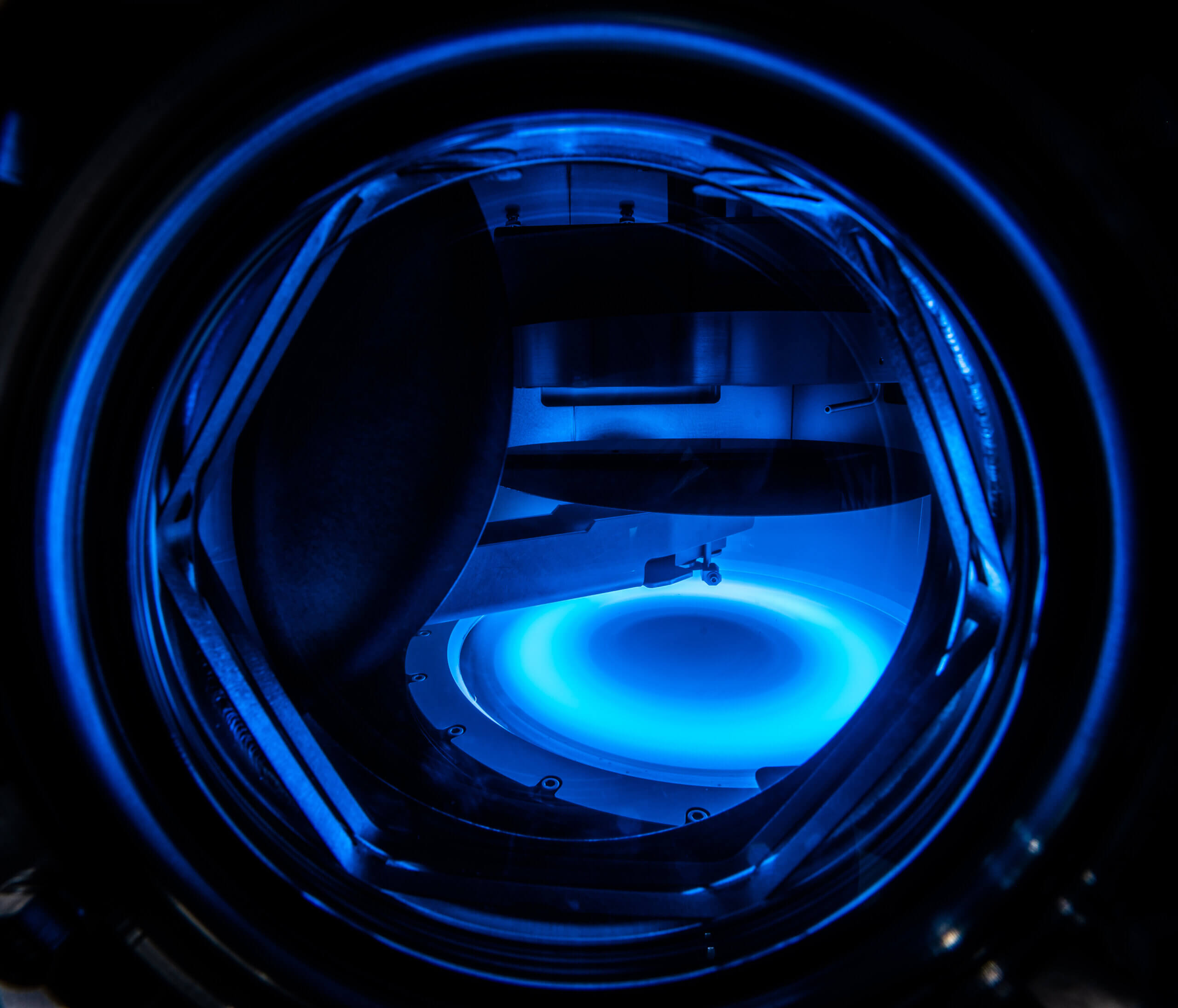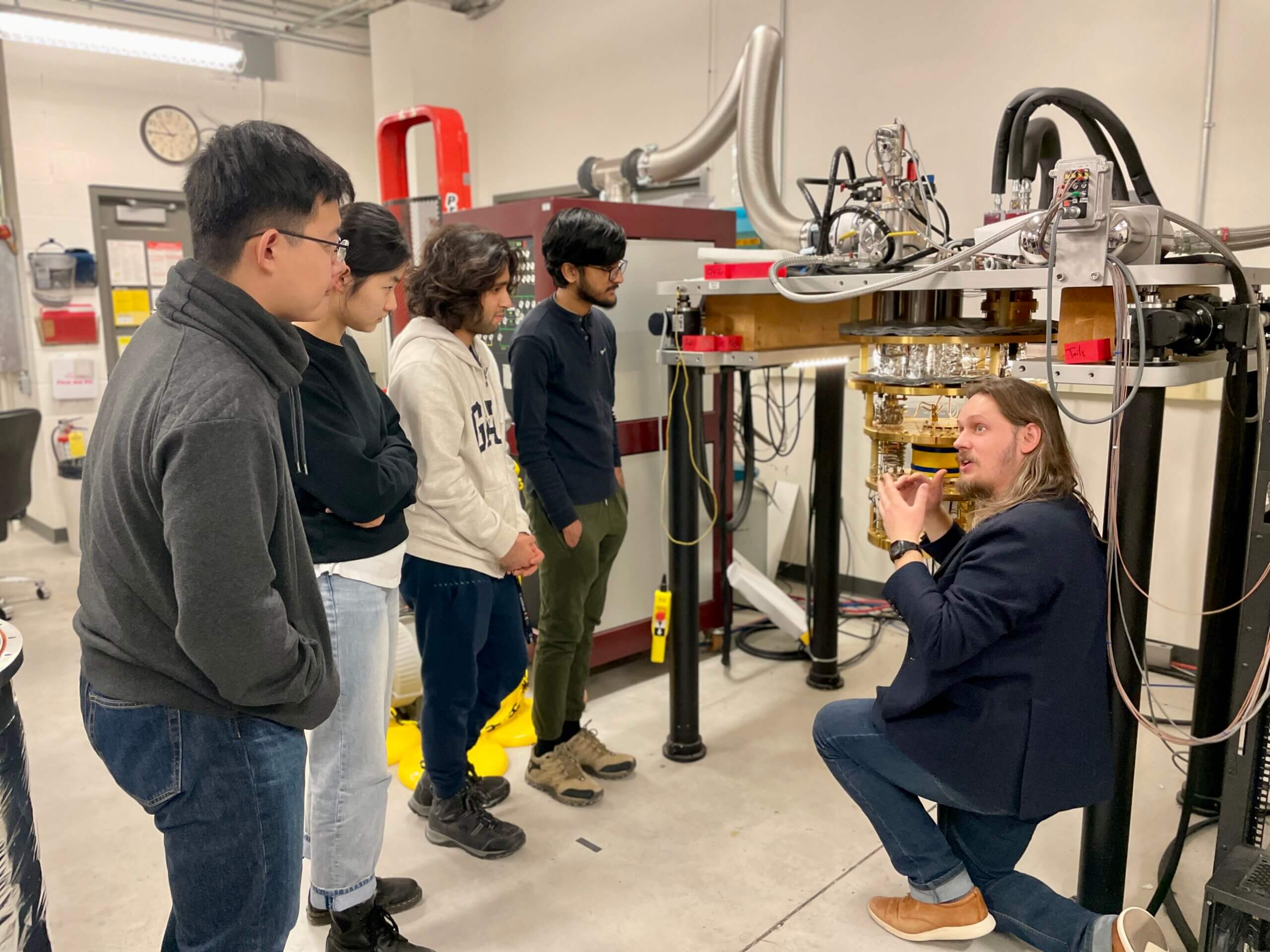
Physical Vapour Deposition (PVD) Introductory Seminar
Physical Vapour Deposition (PVD) Introductory Seminar Event to be held on Wednesday, January 29, 2025, 10:00 AM – 2:30 PM, QNC 0101. Physical vapour deposition (PVD) is an important category of film growth techniques for quantum, nanotechnology, and semiconductor devices. The Quantum Nano Fabrication and Characterization Facility (QNFCF) houses a wide variety of PVD […]
January 14, 2025

Reflecting on a year of community, growth and milestones at the Institute for Quantum Computing
Reflecting on a year of community, growth and milestones at the Institute for Quantum Computing Wednesday, December 18, 2024 As the year draws to a close, we reflect proudly on the accomplishments of the Institute for Quantum Computing’s (IQC) community of researchers, postdoctoral fellows and graduate students for their research excellence, academic achievements and […]
December 18, 2024

Students with interdisciplinary backgrounds harness the second quantum revolution
Students with interdisciplinary backgrounds harness the second quantum revolution Monday, December 9, 2024 En Français Graduates and program leaders of IQC’s Master of Science degree in Physics with a specialization in Quantum Technology explain the purpose and benefits of the program. The International Year of Quantum Science and Technology (IYQ) is just around the corner […]
December 9, 2024
Patent Information Session
Patent Information Session Event to be held: Thursday, April 25, 1-2 pm, RAC 1, 3003 TQT will be hosting a Patent Information Session on Thursday, April 25, 1 pm – 2 pm at RAC 1, 3003. Hear from Velocity and TQT representatives on the support and resources that are available for TQT researchers regarding […]
April 4, 2024
Waterloo's Quantum
Valley
QVI - Quantum Valley Investments RAC - RAC Complex QVIL - Quantum Valley Ideas Lab IQC - Institute for Quantum Computing at the University of Waterloo (UW) QNF - Quantum Nanofab, UW PI - The Perimeter Institute for Theoretical Physics LI - Lazardis Institute for the Management of Technology

QNFCF and TQT celebrate the opening of the IAFL
QNFCF and TQT celebrate the opening of the IAFL Event held on Thursday, June 6, 2024 On June 6, the QNFCF and TQT team welcomed the University of Waterloo community and industry partners to the opening of the Inert Atmosphere Fabrication Lab (IAFL). The event brought together 60 attendees, including faculty, students, staff and […]
June 12, 2024

Taking quantum to the community
Taking quantum to the community Friday, June 7, 2024 New quantum-nano fabrication and characterization facility lab advances research and enhances community innovation and collaboration The University of Waterloo has officially opened its state-of-the-art Inert Atmosphere Fabrication Lab (IAFL) as part of the Quantum-Nano Fabrication and Characterization Facility (QNFCF). Many materials used in quantum-nano fabrication […]
June 7, 2024

Inert Atmosphere Fabrication and RAC Capabilities – Open House
Inert Atmosphere Fabrication and RAC Capabilities – Open House Event to be held on Thursday, June 6, 2024, 11:45 AM – 2:00 PM, RAC 1, Room 2009 The Quantum Nano Fabrication and Characterization Facility (QNFCF) and Transformative Quantum Technologies (TQT) will be hosting an open house at the Research Advancement Centre (RAC) to celebrate […]
May 14, 2024

TQT Hosts Lab Tours for Quantum Connections Participants
TQT Hosts Lab Tours for Quantum Connections Participants Event held on Thursday, May 2, 2024 As part of the Quantum Connections Conference, TQT hosted lab tours at the Research Advancement Centre. Participants toured the UHV Deposition Omicron Lab, Inert Atmosphere Fabrication Lab, and Rydberg Atom Array Lab (among others). Thank you to all the […]
May 2, 2024

Designing for a sustainable future using quantum technologies
Designing for a sustainable future using quantum technologies Friday, April 26, 2024 On April 18, Transformative Quantum Technologies (TQT) awarded six research teams and their design ideas for the Quantum for Environment (Q4Environment) Design Challenge, whose green-tech solutions address global environmental issues. Ideas included using quantum computing to improve medical devices, and sensors that […]
April 26, 2024

TQT Hosts a Patent Information Session
TQT Hosts a Patent Information Session Event held on Thursday, April 25, 2024 On April 25, the TQT team welcomed John Dick (Director, Velocity Campus) and Alroy Almeida (Deep Tech Director, Velocity) to highlight the IP support and funding that is available to TQT researchers. The Velocity team drew attention to funding opportunities such […]
April 25, 2024

Science that matters: Master’s student prepares for an imaginative career in the growing quantum industry
Science that matters: Master’s student prepares for an imaginative career in the growing quantum industry Monday. April 15, 2024 Grant Brassem is part of the third cohort of students to embark on the Quantum Technology specialization within the Master of Science in Physics program. This new 12-month, course-based degree lets students push the frontiers of knowledge […]
April 15, 2024

TQT-supported graduate student furthers neutron-based quantum material research with visit to Australia
Melissa Henderson, a Ph.D. student at the Institute for Quantum Computing supervised by Dr. Dmitry Pushin, visited the Australian Nuclear Science and Technology Organisation (ANSTO) to perform a small-angle neutron scattering (SANS) tomography experiment and present a seminar. Henderson presented a talk titled “Visualizing Skyrmion Topological Transition Pathways via Three-Dimensional Neutron Tomography” to an audience […]
May 25, 2023
New device structure can improve the properties of integrated circuits towards low-power electronics
The development of a novel computational framework to investigate two-dimensional quantum material-based negative capacitance (NC) field-effect transistors (FETs) will enhance low-power electronics. “Mobile electronics, such as smartphones and laptops, rely on low-power electronic devices. Prioritizing lower power consumption in the design of these mobile electronics increases the usage time between charges and reduces the […]
April 17, 2023
Integrated external cavity lasers will enhance quantum atomic technologies
Photonic integrated circuits could reduce laser systems to chip-scale devices. Cold atoms provide a powerful platform for the implementation of technological applications in quantum computing, sensing and communication. Electronic transitions in these atoms have very precise and particular wavelengths. Lasers that can be tuned to these exact wavelengths are required to manipulate the internal […]
April 17, 2023

TQT’s Quantum Quest Seed Fund awarded to eight new projects spanning quantum materials to quantum dots
Developing new two-dimensional (2D) quantum materials and heterostructures to advance quantum technology development are among the goals of the eight projects supported by the 10th and 11th cycles of the Quantum Quest Seed Fund. The Quantum Quest Seed Fund (QQSF) is designed to encourage quantum innovation across the grand challenges of the Transformative Quantum […]
April 10, 2023

Towards large area, resonant quantum tunneling diodes by continuous Langmuir transfer of exfoliated 2D materials
Summary Atomically thin 2D materials constitute promising building blocks for quantum devices due to their exotic, layer-dependent electronic properties. The ability to stack these materials in alternating layers enables heterostructures to be built in almost limitless combinations and over small enough length scales to observe quantum phenomena. So far though, practical implementation of devices based […]
April 1, 2020

Rydberg Atom Array Quantum Simulator
Summary Quantum simulators enable probing the static and dynamic properties of correlated quantum many-body systems that would otherwise be numerically inaccessible using classical simulators. We are developing quantum simulators based on arrays of neutral atoms excited to Rydberg states. Such Rydberg atom arrays are advantageous for simulating the dynamics of interacting spin systems (Ising spin […]
February 27, 2020

Reliably operating noisy quantum computers
Summary The overall goal of the project is to develop practical methods to be able to reliably run useful applications on near-term quantum computers. This requires identifying and overcoming the ubiquitous errors that currently limit quantum computing capabilities. Traditional methods of quantifying errors in quantum computers fail to predict how errors affect the output of […]
January 22, 2020

Quantum Material Multilayer Photonic Devices and Network
Summary Realizing highly integrated quantum photonic devices on a chip can enable new opportunities for photonic quantum computation. In this project, we explore heterostructures of stacked two-dimensional (2D) materials, such transition metal dichalcogenides (TMDC) or graphene, combined with optical microcavities as a platform for such devices. 2D materials are extremely thin and flexible, and have […]
December 12, 2019

Tuning Spin-Exchange Interactions in Low-Dimensional Metal Halide Perovskites: A New Class of Semiconductor Quantum Materials
Summary Leakage current in electronic components is one of the limiting factors for the performance of conventional computers which use charges and currents as physical information carriers. Spintronics offers an alternative by using electron spin for information transfer, processing and storage, enabling the design of non-volatile computer memory and more energy-efficient electronic devices. In this […]
October 1, 2019

Free-space Polarization-selective Microcavity based on Chiral Metasurfaces
Summary Developing a new type of Fabry-Pérot cavity that allows improved control of the atoms’ emission into the cavity mode will result in enhancement of the efficiency and fidelity of quantum state transfer from photons to atoms and back. This in turn can be used to improve the performance of quantum networks and repeaters, as […]
September 19, 2019

Entangled Photon Orbital Angular Momentum Arrays
Summary Arrays of orbital angular momentum (OAM) states of light are a new form of structured light so far relatively unexplored in quantum information science. Unlike spin angular momentum of light, which is related to light’s polarization and covers two dimensions, OAM states, sometimes described as ‘donut beams’ due to the shape of the field […]
September 19, 2019
QuantumIon: an open-access quantum computing platform
Summary Trapped ions are one of the most advanced technologies for quantum computing, offering multi-qubit control in a universal quantum computing architecture and the ability to perform calculations with unprecedented precision. In this project we construct a shared trapped-ion quantum computing platform, QuantumIon, that will enable a broader and interdisciplinary scientific community to access an […]
September 9, 2019
Line-Scanning optical coherence tomography system for in-vivo, non-invasive imaging of the cellular structure and blood perfusion of biological tissue
Summary Optical coherence tomography (OCT) is an optical imaging method that allows for in-vivo, non-invasive imaging of the structure and vasculature of biological tissue. Commercially available, clinical OCT systems utilize point-scanning method to acquire volumetric images over a large surface with typical frame rates of ~ 30 frames/ second. Since living biological tissue is constantly […]
August 27, 2019
